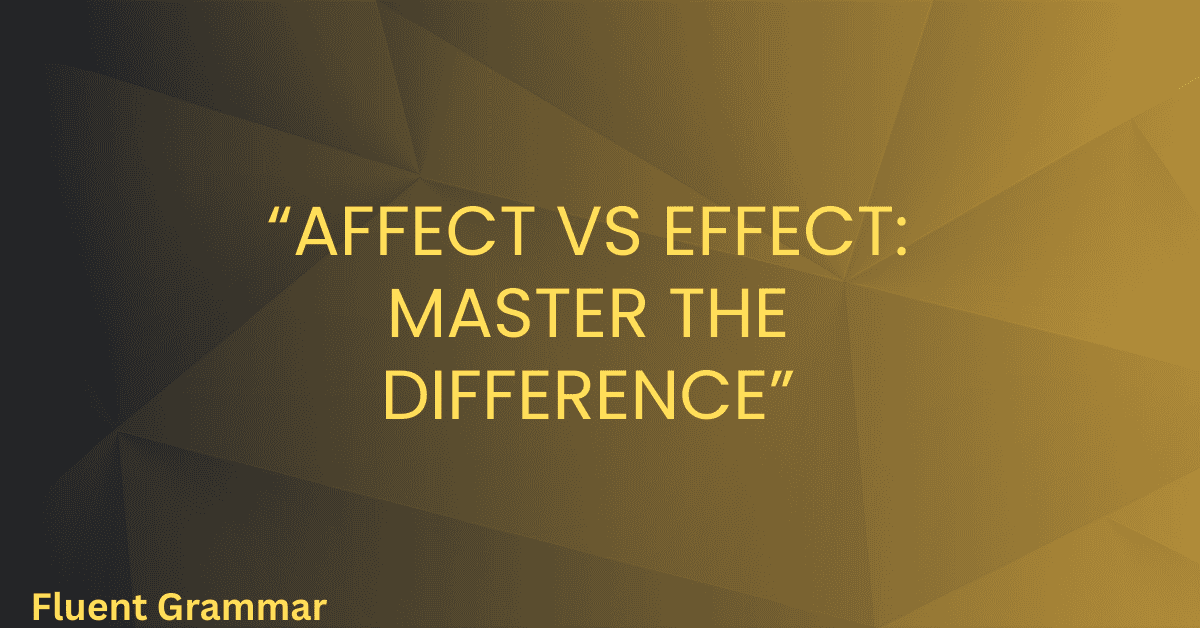Have you also been perplexed by the “affect vs effect” question? Honestly speaking, affect and effect are two of the most confusing words in the English language. They look similar, sound similar, and sometimes feel interchangeable. But using them incorrectly can affect your credibility—and that effect might be more serious than you think!
In this post, we’ll break down the difference between affect and effect, give you easy tricks to remember them, and share real-world examples you can actually relate to.
Table of Contents
🔍 Affect vs Effect: What’s the Difference?
| Word | Part of Speech | Meaning | Example |
| Affect | Verb | To influence something | “The weather can affect your mood.” |
| Effect | Noun | The result or outcome | “The new law had a positive effect.” |
🧠 When to Use ‘Affect’
The word affect is most commonly used as a verb, meaning to influence or make a difference to something.
✏️ Examples:
- Lack of sleep can negatively affect your concentration.
- Her speech deeply affected the audience.
- How will the price hike affect customers?
Affect can also be used in the sense “to pretend or to put a false appearance”.
✏️ Examples:
- The beggar affects blindness.
- He affected American accent.
🎯 When to Use ‘Effect’
Effect is usually a noun, referring to a change that is a result or consequence of an action.
✏️ Examples:
- The new app had a huge effect on my productivity.
- Caffeine has little effect on me now.
- The special effects in that movie were amazing!
💡 Quick Trick to Remember
✨ If you’re describing an action, use affect.
🏁 If you’re describing a result, use effect.
Think:
- Affect = Action (both start with A)
- Effect = rEsult (both contain E)

❓ Common Mistakes and FAQs
❌ Can ‘Effect’ Be a Verb?
Yes, but it’s rare. Effect as a verb means “to bring about” or “to cause to happen.”
- The manager effected major changes in the policy.
In this case, effect means to cause, which is stronger than affect, which only influences.
❌ Can ‘Affect’ Be a Noun?
Rarely, but in psychology, affect (noun) refers to emotional expression.
- The patient displayed a flat affect.
Unless you’re writing a clinical paper, you’re unlikely to use affect this way.
🧪 Quiz: Test Your Knowledge
Try these! Choose the correct word: affect or effect.
- The new manager’s style didn’t ____ morale.
- The ____ of meditation on anxiety is well documented.
- Will the new tax laws ____ small businesses?
- One side ____ the outcome of the election.
- Her decision had a huge ____ on our team.
Answers:
- affect
- effect
- affect
- affected
- effect
🗣️ How to Use ‘Affect’ and ‘Effect’ in Real Life
Here are some natural, day-to-day uses of these tricky words:
- Casual Talk:
Ugh, this gloomy weather really affects my mood - At Work:
Let’s look at the effect of this campaign on our engagement numbers.
In Emails:
These changes won’t affect our launch timeline.
🔗 Related Grammar Tips
Want to explore more commonly confused words?
Check out:
And here’s a great external reference:
🔚 Conclusion: You’ve Got This!
Let’s recap:
- Affect is usually a verb – it causes a change.
- Effect is usually a noun – it is the result.
- Use the “Affect = Action” trick to stay on track.
With these tips, you won’t just understand the difference—you’ll remember it for good.

